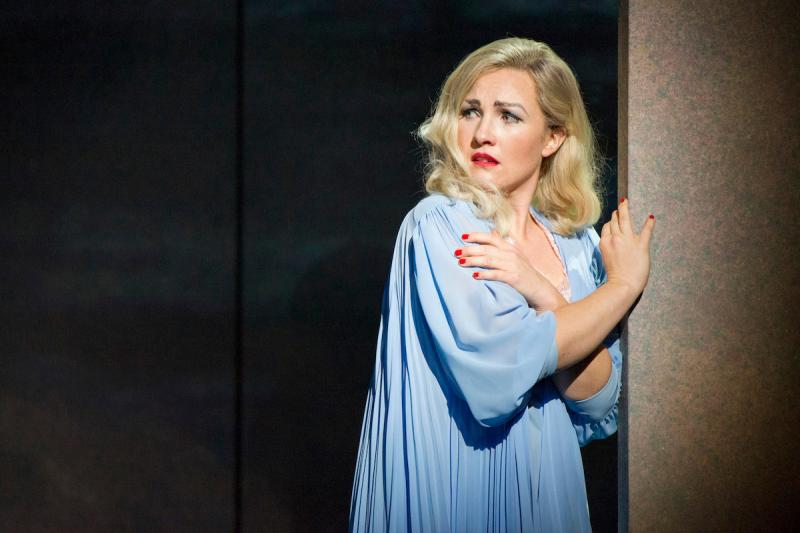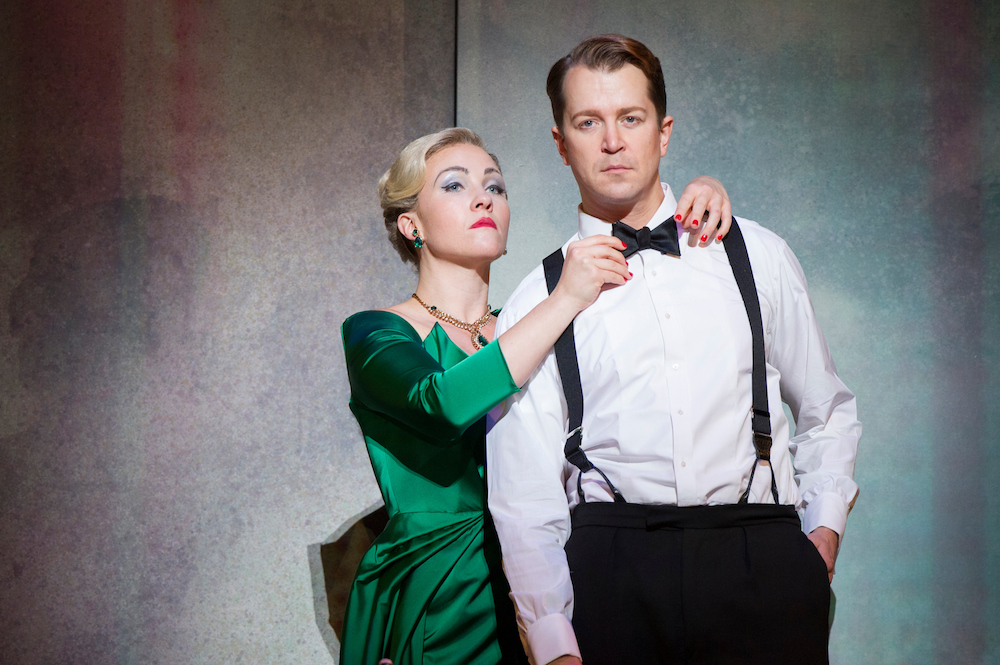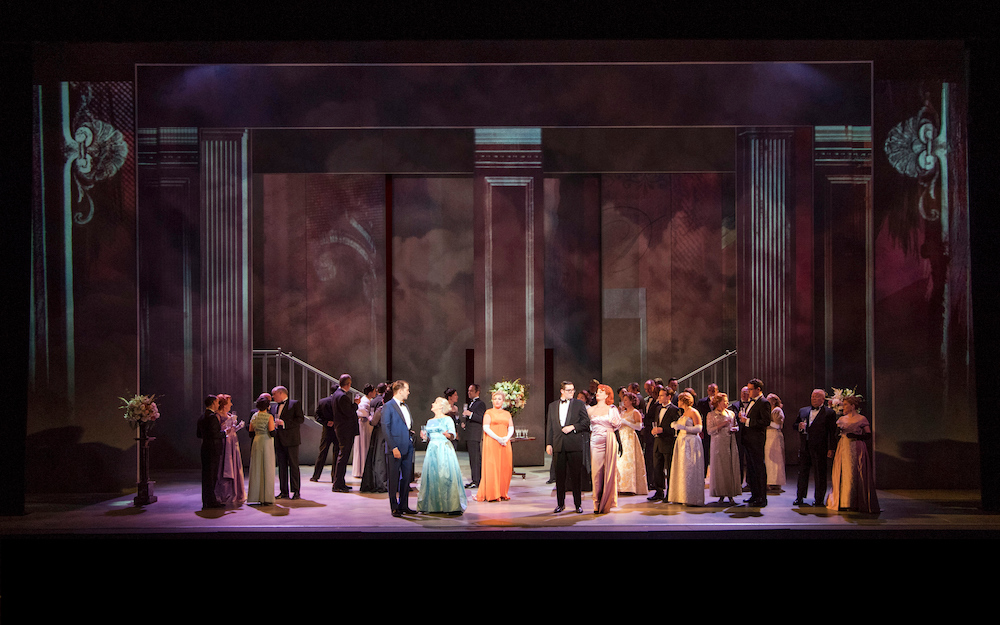Marnie, English National Opera review – hyped new opera doesn’t hit the heights | reviews, news & interviews
Marnie, English National Opera review – hyped new opera doesn’t hit the heights
Marnie, English National Opera review – hyped new opera doesn’t hit the heights
Nico Muhly’s world premiere offered musical pleasures but too many flaws to be great

The great and good of the London music scene were gathered at English National Opera last night for the unveiling of American Wunderkind Nico Muhly’s new opera, Marnie. Although it was commissioned by the Met in New York, somehow ENO managed to wangle the world premiere, which has been widely hyped and was ecstatically received by a packed house.
Marnie is a 1964 psychological thriller by Alfred Hitchcock, based on the Winston Graham novel of 1961. The opera looks more to the novel than the film (although the programme declares the production is “by special arrangement with Universal Pictures”). The English setting is restored, making more sense of the hunting scene, as are a number of characters and a more ambivalent ending.
I watched the Hitchcock Marnie in preparation for the opera and didn’t like its melodrama or its, for me, overblown Bernard Herrmann score. Muhly’s music is definitely more self-controlled and acute – ironically in a sense less “operatic” – but the story remains sensational and histrionic. It tells of a woman who moves from secretarial job to job in provincial England stealing money from her employers before changing her identity and repeating the process. She is a liar and a thief, sexually alluring although sex-averse, with her behaviour guided by a deep guilt about a violent incident in her childhood.
Marnie is blackmailed into marriage by the businessman Mark Rutland, who knows about her thefts, but when he tries to rape her, Marnie attempts suicide (strangely, this is not mentioned again). In the final scene the truth of the incident in Marnie’s childhood relieves her of her decades of guilt. As the police move in to arrest her, she declares “I’m free.” The production (designed by Julian Crouch) is visually pleasing, combining naturalistic period furniture and costume with more abstracted animated projections. The costuming offered some lovely tableaus of acres of grey office dress with Marnie alone in a bright colour. Sasha Cooke as Marnie (pictured above with Daniel Okulitch) sang beautifully, especially in her reflective arias placed between the main scenes, her tone rich and expressive. Marnie is usually accompanied by a quartet of “Shadow Marnies”, echoing and decorating her lines in what Muhly describes as “an early music style”.
The production (designed by Julian Crouch) is visually pleasing, combining naturalistic period furniture and costume with more abstracted animated projections. The costuming offered some lovely tableaus of acres of grey office dress with Marnie alone in a bright colour. Sasha Cooke as Marnie (pictured above with Daniel Okulitch) sang beautifully, especially in her reflective arias placed between the main scenes, her tone rich and expressive. Marnie is usually accompanied by a quartet of “Shadow Marnies”, echoing and decorating her lines in what Muhly describes as “an early music style”.
Countertenor James Laing impressed as Mark’s brother Terry but Mark Rutland himself, sung by Daniel Okulitch, was a little underpowered. The chorus, extensively used, were in good voice, whether as office workers, hunters or funeral hymn-singers.
Muhly’s music is colourful and inventive. He clearly has no shortage of ideas, as his astonishingly prodigious output shows – according to the programme, he has written over 100 pieces since his opera Two Boys arrived at ENO in 2011. In style the music is closest to John Adams, with post-minimalist pulsing textures and a largely diatonic, if not tonal, harmonic vocabulary. But there weren’t the moments either of orchestral or melodic magic that light up, for example, Nixon in China, and that remain in mind after the show has ended. The scoring was sufficiently spare that the voices mostly cut through (and overscoring is a common failing in contemporary opera), but there were times Muhly’s favoured skittering flutes obscured important words. Conductor Martyn Brabbins kept everything on a tight rein, and trumpets and percussion were on good form. The unforgiving oboe part, identified with the character of Marnie, resulted in some issues of intonation, and the lines written for the treble, sung by William Brady, were thankless, if not downright unkind.
The scoring was sufficiently spare that the voices mostly cut through (and overscoring is a common failing in contemporary opera), but there were times Muhly’s favoured skittering flutes obscured important words. Conductor Martyn Brabbins kept everything on a tight rein, and trumpets and percussion were on good form. The unforgiving oboe part, identified with the character of Marnie, resulted in some issues of intonation, and the lines written for the treble, sung by William Brady, were thankless, if not downright unkind.
The biggest problems were, perhaps, in the libretto. First there was so much story to be got through that a lot of the dialogue was mundane exchanges of plot information. A related problem was that, although not falling into the familiar trap of verbosity, the leanness of the libretto meant a shortage of poetry. And there were some unforgivable lapses into banality, such as Mark’s final line “I’m here for you”, to which Marnie replies “I’ll be there for myself”. I winced.
The production, directed by Michael Mayer, combined naturalistic scenes with stylised elements such as the “Shadow Marnies”. Other stylisations were less successful, most notably the horse-riding accident, which was always going to be difficult to stage convincingly, but was overlong and, in the writhing of the group of dancers, a bit silly.
Ultimately, the difficulty is in sympathising with the central character, whose unknowability is mysterious but also alienating. The book is in the first person, and the interest is in what Marnie reveals despite herself. As portrayed from outside, it is unclear what attracts Mark – whose attempted sexual assault of Marnie obviously makes him less appealing. So while there were many good things to enjoy, the whole thing did not offer as engaging a theatrical experience as Benjamin's Written on Skin, for me the benchmark for 21st century opera. This was an enjoyable evening, but not the hoped-for modern classic.
Add comment
The future of Arts Journalism
You can stop theartsdesk.com closing!
We urgently need financing to survive. Our fundraising drive has thus far raised £49,000 but we need to reach £100,000 or we will be forced to close. Please contribute here: https://gofund.me/c3f6033d
And if you can forward this information to anyone who might assist, we’d be grateful.

Subscribe to theartsdesk.com
Thank you for continuing to read our work on theartsdesk.com. For unlimited access to every article in its entirety, including our archive of more than 15,000 pieces, we're asking for £5 per month or £40 per year. We feel it's a very good deal, and hope you do too.
To take a subscription now simply click here.
And if you're looking for that extra gift for a friend or family member, why not treat them to a theartsdesk.com gift subscription?
more Opera
 The Railway Children, Glyndebourne review - right train, wrong station
Talent-loaded Mark-Anthony Turnage opera excursion heads down a mistaken track
The Railway Children, Glyndebourne review - right train, wrong station
Talent-loaded Mark-Anthony Turnage opera excursion heads down a mistaken track
 La bohème, Opera North review - still young at 32
Love and separation, ecstasy and heartbreak, in masterfully updated Puccini
La bohème, Opera North review - still young at 32
Love and separation, ecstasy and heartbreak, in masterfully updated Puccini
 Albert Herring, English National Opera review - a great comedy with depths fully realised
Britten’s delight was never made for the Coliseum, but it works on its first outing there
Albert Herring, English National Opera review - a great comedy with depths fully realised
Britten’s delight was never made for the Coliseum, but it works on its first outing there
 Carmen, English National Opera review - not quite dangerous
Hopes for Niamh O’Sullivan only partly fulfilled, though much good singing throughout
Carmen, English National Opera review - not quite dangerous
Hopes for Niamh O’Sullivan only partly fulfilled, though much good singing throughout
 Giustino, Linbury Theatre review - a stylish account of a slight opera
Gods, mortals and monsters do battle in Handel's charming drama
Giustino, Linbury Theatre review - a stylish account of a slight opera
Gods, mortals and monsters do battle in Handel's charming drama
 Susanna, Opera North review - hybrid staging of a Handel oratorio
Dance and signing complement outstanding singing in a story of virtue rewarded
Susanna, Opera North review - hybrid staging of a Handel oratorio
Dance and signing complement outstanding singing in a story of virtue rewarded
 Ariodante, Opéra Garnier, Paris review - a blast of Baroque beauty
A near-perfect night at the opera
Ariodante, Opéra Garnier, Paris review - a blast of Baroque beauty
A near-perfect night at the opera
 Cinderella/La Cenerentola, English National Opera review - the truth behind the tinsel
Appealing performances cut through hyperactive stagecraft
Cinderella/La Cenerentola, English National Opera review - the truth behind the tinsel
Appealing performances cut through hyperactive stagecraft
 Tosca, Royal Opera review - Ailyn Pérez steps in as the most vivid of divas
Jakub Hrůša’s multicoloured Puccini last night found a soprano to match
Tosca, Royal Opera review - Ailyn Pérez steps in as the most vivid of divas
Jakub Hrůša’s multicoloured Puccini last night found a soprano to match
 Tosca, Welsh National Opera review - a great company reduced to brilliance
The old warhorse made special by the basics
Tosca, Welsh National Opera review - a great company reduced to brilliance
The old warhorse made special by the basics
 BBC Proms: The Marriage of Figaro, Glyndebourne Festival review - merriment and menace
Strong Proms transfer for a robust and affecting show
BBC Proms: The Marriage of Figaro, Glyndebourne Festival review - merriment and menace
Strong Proms transfer for a robust and affecting show
 BBC Proms: Suor Angelica, LSO, Pappano review - earthly passion, heavenly grief
A Sister to remember blesses Puccini's convent tragedy
BBC Proms: Suor Angelica, LSO, Pappano review - earthly passion, heavenly grief
A Sister to remember blesses Puccini's convent tragedy

Comments
Why the unrealistic
An interesting and detailed
In my experience, you know an
In my experience, you know an opera that will last when you first see it - something has to excite you or at least go deep and intrigue. The first UK performance of Nixon in China at the Edinburgh Festival is a stand-out in my memory. Barry's The Importance of Being Earnest likewise.
Could I ask the first commenter to clarify what he or she means, though? Expecting too much from Muhly, perhaps?
A fair point Bryan, but a any
A fair point Bryan, but a any review kind of has an implied 'in my view' around the whole thing, and it can get fussy to keep qualifying comments. But you are right: I might be proved completely wrong
I was there. This review
I enjoyed the orchestration,
Hard to find a sympathetic